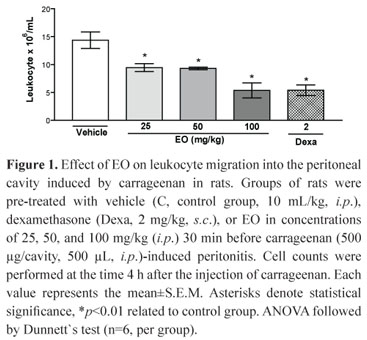Chrysopogon zizanioides (L.) Roberty, Poaceae, is a plant widely used in northeast Brazil in folk medicine for the treatment of various pathological conditions, including inflammatory pain. The present study evaluated the antinociceptive and anti-inflammatory effects of C. zizanioides essential oil (EO) in rodents. EO was further characterized by GC/MS. The major components of EO were identified as khusimol (19.57%), E-isovalencenol (13.24%), α-vetivone (5.25%), β-vetivone (4.87%) and hydroxy-valencene (4.64%). Following intraperitoneal injection (i.p.), EO at 50 and 100 mg/kg significantly reduced the number of writhes (51.9 and 64.9%, respectively) and the number of paw licks during phase 2 (56.7 and 86.2%, respectively) of a formalin model when compared to control group animals. However, EO-treated mice were ineffective at all doses in hot-plate and rota-rod tests. The EO inhibited the carrageenan-induced leukocyte migration to the peritoneal cavity in a dose-dependent manner (34.7, 35.4, and 62.5% at doses of 25, 50 and 100 mg/kg, respectively). In the paw edema test, the EO (100 mg/kg) inhibited all three phases of the edema equally well, suggesting that the EO has a non-selective inhibitory effect on the release or actions of these mediators. Our results suggest possible antinociceptive and anti-inflammatory effects of the EO.
anti-inflammatory effect; antinociceptive effect; Chrysopogon zizanioides; essential oil; phytochemical screening; vetiver





